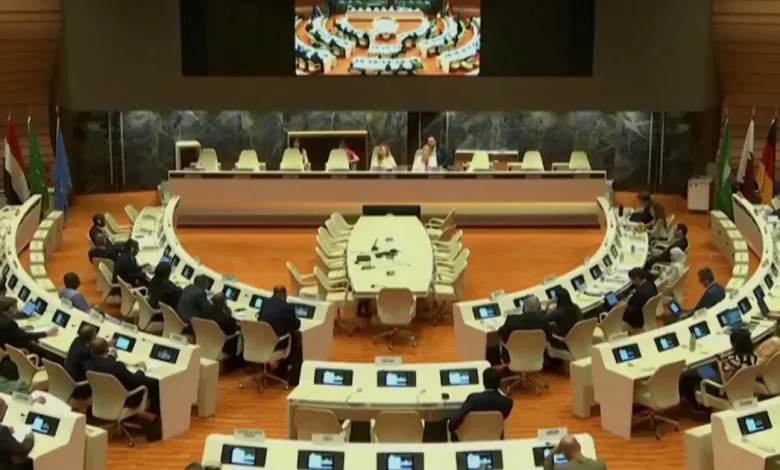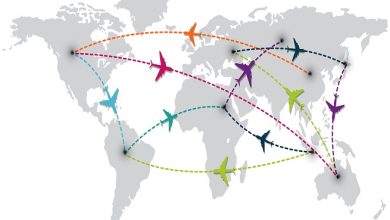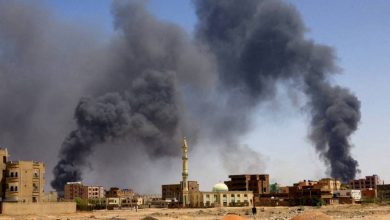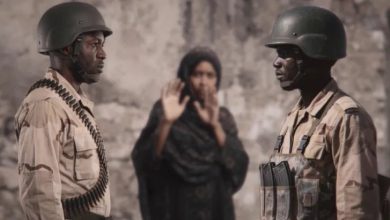Geneva negotiations: A UN Lawsuit under Flames of Militia Violations

Sudan Events – Abdel-Basset Idris
UN call for the Sudanese government and Hemeti’s militia to hold indirect negotiations in Geneva is facing collapse even before it is launched, due to the militia’s ongoing violations on the ground, at a time when the Sudanese army has set conditions for negotiations with the militia.
Limited negotiations:
Sources told (Sudan Events ) that the negotiations that the United Nations UN intends to launch are limited and do not include the axes of the humanitarian crisis and those who caused it, and are limited only to getting the army and the Rapid Support Forces RSF to sign a ceasefire agreement in Al-Fasher and bringing in humanitarian aid through the border crossings with Chad and the Central African Republic (CAR)without restrictions.
The source asked, “The United Nations did not seek to implement this agreement in Al-Geneina, when the Rapid Support Forces RSF killed 15,000 Masalit people and forcibly displaced hundreds of thousands, and it does not even include the rest of the cities in Sudan that the militia prevents from providing services to. So why insist on Al-Fasher only?
Al-Amamra Invitation:
The United Nations UN invited the Government and the Rapid Support Forces RSF to negotiations in the Swiss capital, Geneva. The Sudan Tribune website said that the invitation aims to hold indirect negotiations next week to discuss facilitating the delivery of aid to those affected by the fighting and protecting civilians.
The Special Envoy of the Secretary-General of the United Nations, Ramtane Al Amamra, sent a letter to the President of the Sovereignty Council TSC and Commander-in-Chief of the SAF ,Lt.Gen. Abdel Fattah Al-Burhan, on June 26, proposing to send a limited high-level delegation to Geneva on July 10 to begin discussions with the Rapid Support Forces RSF under the auspices of the United Nations UN .
According to the letter, which Sudan Tribune has reviewed, the negotiations will focus on the measures that must be taken to ensure the distribution of humanitarian aid to all Sudanese people in need, in addition to examining options to ensure the protection of civilians.
He continued: “The aim of these discussions is to identify ways to advance specific humanitarian measures and protect civilians through a possible ceasefire.”
References to the invitation:
According to Sudan Events follow-ups, the decision comes against the backdrop of the Security Council assigning the matter of addressing the humanitarian situation to the Secretary-General of the United Nations after the failure of issuing a new resolution by the Council in a session prepared for this purpose, and the Security Council requested the Secretary-General to inform it of the measures he will take regarding the results of his consultations with the Sudanese authorities and other parties on the matter.
International Concern:
The United Nations UN recently expressed its concern about the worsening humanitarian crisis in Sudan due to the war, and warned of the crisis exploding to become the most catastrophic in the world.
The Director of Operations at the United Nations Office for the Coordination of Humanitarian Affairs, Edem Wosoorno, said
Since then, at least 14,600 people have been killed, including many women and children, and 26,000 others have been injured, according to the latest data issued by the United Nations Human Rights Office.
The war has also forced about 6.5 million people to flee their homes in Sudan, while an additional 1.8 million people have fled to neighboring countries, in what Wosoorno described as “the largest internal displacement crisis in the world.”
Wosorno also warned of a looming famine in Sudan, where more than 18 million people – more than a third of Sudan’s total population – already face severe food insecurity.
Earlier, Finance Minister Jibril Ibrahim said that Sudan is not facing famine, but Hemeti’s militia is obstructing the flow of aid and goods to the rest of the states.
Deficit or slowdown? :
The United Nations or the Security Council have not taken any measures to force Hemeti’s militia to stop attacking safe cities and villages that are already devoid of army bases. The militia’s attacks have displaced millions of Sudanese from their cities and killed thousands, in addition to the systematic looting of their property.
The latest was Hemeti’s militia’s attack on the cities of Sinja and Al-Dinder, which led to the displacement of more than 55,000 people from Sennar state in tragic humanitarian conditions as a result of them walking long distances and facing hunger and heavy rains.
The Blue Nile region received about 700,000 IDPs, and the governor of the region, Ahmed Al-Omda, confirmed the provision of security and protection to the displaced persons of Sennar and providing them with assistance, while Gedarif state announced the arrival of 90,000 IDPs and a state government official said that they are working to prepare schools and the land port to receive more displaced persons, whose follow-ups confirmed their presence in large numbers on the road linking Gedarif to Sennar.
Last week, the United Nations announced the failure of aid convoys to enter Central Darfur state after they were subjected to an armed attack by unknown persons, and the United Nations held the Rapid Support RSF Militia and the Abdel Wahid Al-Nur Movement responsible for what it called their following of bureaucratic procedures that prevented the arrival of this aid.
Will Sudan respond to the call?
President of the Sovereignty Council and Commander-in-Chief of the SAF, Lt. Gen. Abdel Fattah Al-Burhan, revealed his refusal to sign a unilateral ceasefire agreement in Al-Fasher in light of the militia attacks, and Al-Burhan urged the mediators to demand that Hemeti’s militia leave the homes of citizens and stop attacking civilians.
In the context, the Sudanese army set conditions for negotiating with the militia. According to (Al Jazeera Net), the assistant commander-in-chief, Lt. Gen. Yassir Al-Atta, said that the SAF’ conditions for negotiating with the Rapid Support Forces RSF are: the surrender of the Rapid Support Forces, “and 5 camps have been identified to transfer their forces to, with a pledge not to attack or target them as long as they are in those locations.” Withdrawing from all residential areas and evacuating the buildings they have controlled over the past months.
Handing over weapons and combat equipment, returning foreign fighters to their countries, and handing over those being prosecuted on charges related to violations that occurred during the past period, “which included looting, rape crimes, and infringement of citizens’ rights.” He said that there will be no political or military presence for the Rapid Support Forces RSF in the armed forces in the future.
In contrast, the researcher specializing in United Nations affairs, Abazar Kamal, told Sudan Events hat negotiations of a technical military nature related to the cessation of fighting and the future of the rebel forces differ from talks of a humanitarian nature. In light of the failure to address the two issues within a comprehensive framework, Kamal believes that the government should respond to the humanitarian negotiations in confirmation of its declared commitment before the Security Council. He suggests that it should be accompanied by Jeddah Agreement and the Saudi position documented by the Security Council that the Rapid Support Forces RSF did not abide by the Jeddah Agreement.
Kamal affirmed the necessity of not signing an agreement that serves one areas and excludes other areas, considering that any government that does such a thing does not respect its people.



